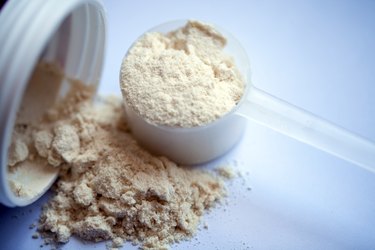
If you're spending more time in the bathroom, with minimal action, you might be wondering if your morning shake is resulting in protein powder constipation. While certain types of protein can cause gastrointestinal discomfort, in general, protein powder does not cause constipation.
What is Protein Powder?
Video of the Day
Protein powder is a nutritional supplement many people add to their diet. It comes in a variety of flavors like vanilla, strawberry or chocolate. It's also made with different types of protein such as whey, casein, egg or hemp.
Video of the Day
Choosing the best protein powder for you depends on a variety of factors such as cost, ease of use, dietary needs and goals. There are several different types of protein powder including:
- Whey protein powder, isolate, concentrate and hydrolysate
- Casein protein
- Egg protein
- Soy protein
- Rice protein
- Pea protein
- Hemp protein
For animal-based protein powders, you can choose from whey, casein and egg. Both whey and casein protein comes from milk, so if you have issues with lactose or dairy, and you experience any side effects from using this type of protein powder, you may want to try a non-dairy based product. It's also a good idea to consider the liquid you're mixing the protein powder with and determine if that is causing the discomfort.
Some products will combine all three animal-based proteins into one powder, broken down by percentages of each protein. If you're vegetarian or want a plant-based protein, stick with rice, pea or hemp, especially if you're struggling with protein powder constipation.
Read more: Can Too Much Protein Hurt Your Stomach?
Protein Powder Side Effects
The U.S. Food and Drug Administration does not review dietary supplements for safety and effectiveness before they're marketed; that's left up to the manufacturer. If you've recently added protein powder to your diet and you're experiencing any side effects related to gas, bloating or constipation, it's time to examine the label.
Harvard Health reports that certain protein powders, more specifically, milk-based protein, may cause digestive stress, especially for anyone who is allergic to dairy or has trouble digesting lactose. If you're using a whey protein powder, check to see what type it is. For a dairy-free alternative consider trying pea, hemp, rice or soy protein powder.
The protein powder you choose will depend on your goals and dietary needs. However, if you're trying to avoid protein powder constipation or any other gastrointestinal distress, the Cleveland Clinic recommends steering clear of products that contain lactose sugars, artificial sweeteners or maltodextrins. Plus, if gluten is a concern, make sure to read the label for any mention of gluten, and avoid using any product that contains it.
Troubleshooting the cause of your constipation might require you to look beyond the protein powder. A lack of fiber from fruits and vegetables can contribute to constipation. In some people, gluten may cause constipation, according to the Mayo Clinic. If you think you have protein powder side effects, consider stopping the use of the protein you're consuming and see if your constipation goes away.
How Much Do You Need?
The amount of protein you need each day depends on a variety of factors including your weight and activity level. At a minimum, Harvard Health says you should aim for 0.8 grams of protein per kilogram of body weight. If you want to avoid doing all the math, consider using this online calculator from the USDA that determines all of your daily dietary needs. For example, a 40-year-old active male that's 6 feet tall and weighs 170 pounds needs 62 grams of protein per day.
Since this is the minimum, many experts believe that very active people should consume more protein. The Academy of Nutrition and Dietetics, for example, recommends that athletes consume 1.2 to 2.0 grams of protein per kilogram of body weight per day. While this amount is certainly higher than the minimum, it's still considered a safe range to aim for based on a higher activity level.
In addition to protein powder, other sources of animal and plant protein include fish, lean cuts of meat, chicken, turkey, Greek yogurt, eggs, legumes such as beans and peas, nuts, seeds and whole grains like quinoa, kamut and teff, according to Harvard T.H. Chan School of Public Health.
- Harvard Health Publishing: "The Hidden Dangers of Protein Powders"
- The Cleveland Clinic: "7 Tips for Choosing the Best Protein Powder for You"
- U.S. Food and Drug Administration: "Dietary Supplements"
- Harvard Health Publishing: "How Much Protein do You Need Every Day?"
- The Academy of Nutrition and Dietetics: "Protein and the Athlete"
- Harvard T.H. Chan School of Public Health: "Protein"
- The Mayo Clinic: "Celiac Disease"
Was this article helpful?
150 Characters Max
0/150
Thank you for sharing!
Thank you for your feedback!